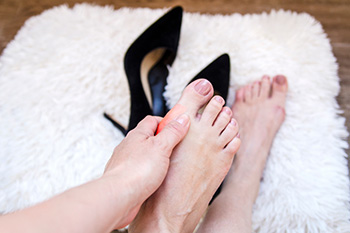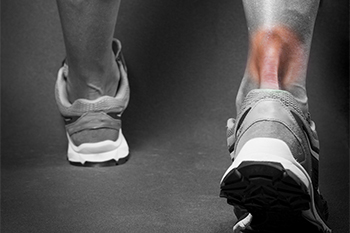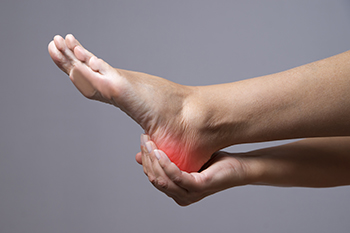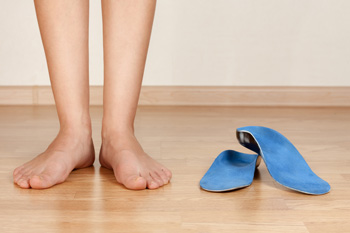Items filtered by date: July 2023
High Heels and Negative Effects on the Feet

Women can feel comfortable wearing high heels in various settings, from casual to formal occasions. The appeal of wearing this type of shoe may include making an individual look taller while enhancing the shape of the legs. Despite this attraction to wearing high heels, they may not be the best for the feet when they are frequently worn. The higher the heel, the greater the impact they can have on the ball of the foot. The heel height can reduce the range of motion in the ankle and may decrease support in the heels. This may cause ankle instability and result in enduring an ankle fracture or sprain. Bunions and hammertoes are common ailments among those who wear high heels daily. The toe areas of high heels can be narrow, causing the toes to shift together and possibly leading to unwanted foot conditions. High-heel wearers may want to compromise and choose a shoe with a wider toe box and a lower heel. If you would like to have additional knowledge about how the feet are affected by wearing high heels, it is suggested that you confer with a podiatrist.
High heels have a history of causing foot and ankle problems. If you have any concerns about your feet or ankles, contact one of our podiatrists from Arcadia Foot and Ankle. Our doctors can provide the care you need to keep you pain-free and on your feet.
Effects of High Heels on the Feet
High heels are popular shoes among women because of their many styles and societal appeal. Despite this, high heels can still cause many health problems if worn too frequently.
Which Parts of My Body Will Be Affected by High Heels?
- Ankle Joints
- Achilles Tendon – May shorten and stiffen with prolonged wear
- Balls of the Feet
- Knees – Heels cause the knees to bend constantly, creating stress on them
- Back – They decrease the spine’s ability to absorb shock, which may lead to back pain. The vertebrae of the lower back may compress.
What Kinds of Foot Problems Can Develop from Wearing High Heels?
- Corns
- Calluses
- Hammertoe
- Bunions
- Morton’s Neuroma
- Plantar Fasciitis
How Can I Still Wear High Heels and Maintain Foot Health?
If you want to wear high heeled shoes, make sure that you are not wearing them every day, as this will help prevent long term physical problems. Try wearing thicker heels as opposed to stilettos to distribute weight more evenly across the feet. Always make sure you are wearing the proper shoes for the right occasion, such as sneakers for exercising. If you walk to work, try carrying your heels with you and changing into them once you arrive at work. Adding inserts to your heels can help cushion your feet and absorb shock. Full foot inserts or metatarsal pads are available.
If you have any questions please feel free to contact our offices located in Scottsdale, North Scottsdale, Mesa, and Sun City, AZ . We offer the newest diagnostic and treatment technologies for all your foot and ankle needs.
Heel Pain and Achilles Tendon Injuries

The Achilles tendon connects the calf muscles to the heels, and despite it being strong, it is not especially flexible. This tendon has a small amount of room to move and an injury can cause it to stretch beyond its normal limits. The noticeable symptoms when the Achilles tendon stretches too far are inflammation, irritation, heel pain, and it is often difficult to walk. People who run and increase speed and distance too quickly may be prone to incurring an Achilles tendon injury, and it is beneficial to perform specific stretches to loosen up this tendon before starting a run. This type of injury may also happen from training in cold weather, having poor running form, or having flat feet. A patient may often seek advice from a podiatrist to find relief from the severe pain this type of injury can cause. An X-ray can be performed that can rule out a fractured bone. If you have heel pain, it is suggested that you visit a podiatrist who can successfully treat an Achilles tendon injury.
Achilles tendon injuries need immediate attention to avoid future complications. If you have any concerns, contact one of our podiatrists of Arcadia Foot and Ankle. Our doctors can provide the care you need to keep you pain-free and on your feet.
What Is the Achilles Tendon?
The Achilles tendon is a tendon that connects the lower leg muscles and calf to the heel of the foot. It is the strongest tendon in the human body and is essential for making movement possible. Because this tendon is such an integral part of the body, any injuries to it can create immense difficulties and should immediately be presented to a doctor.
What Are the Symptoms of an Achilles Tendon Injury?
There are various types of injuries that can affect the Achilles tendon. The two most common injuries are Achilles tendinitis and ruptures of the tendon.
Achilles Tendinitis Symptoms
- Inflammation
- Dull to severe pain
- Increased blood flow to the tendon
- Thickening of the tendon
Rupture Symptoms
- Extreme pain and swelling in the foot
- Total immobility
Treatment and Prevention
Achilles tendon injuries are diagnosed by a thorough physical evaluation, which can include an MRI. Treatment involves rest, physical therapy, and in some cases, surgery. However, various preventative measures can be taken to avoid these injuries, such as:
- Thorough stretching of the tendon before and after exercise
- Strengthening exercises like calf raises, squats, leg curls, leg extensions, leg raises, lunges, and leg presses
If you have any questions please feel free to contact our offices located in Scottsdale, North Scottsdale, Mesa, and Sun City, AZ . We offer the newest diagnostic tools and technology to treat your foot and ankle needs.
Several Reasons Heel Pain Can Develop

The heel is an interesting part of the foot. It is a cushioned area that is formed with fatty tissue and is able to hold the weight of the body. Patients may experience heel pain for various reasons. These can include frequently standing or walking on hard surfaces, becoming obese, or if a foot injury has occurred. The condition that is known as plantar fasciitis affects the heel and can be painful. It can happen as a result of an irritated plantar fascia, which is the portion of tissue on the sole of the foot that connects the heel to the toes. This can become injured or torn, and medical attention is often sought for relief. Heel pain can also happen from wearing shoes that do not fit correctly, or if a heel spur has developed. If you have heel pain, it is strongly suggested that you consult a podiatrist who can correctly determine what the cause is, and offer effective treatment options.
Many people suffer from bouts of heel pain. For more information, contact one of our podiatrists of Arcadia Foot and Ankle. Our doctors can provide the care you need to keep you pain-free and on your feet.
Causes of Heel Pain
Heel pain is often associated with plantar fasciitis. The plantar fascia is a band of tissues that extends along the bottom of the foot. A rip or tear in this ligament can cause inflammation of the tissue.
Achilles tendonitis is another cause of heel pain. Inflammation of the Achilles tendon will cause pain from fractures and muscle tearing. Lack of flexibility is also another symptom.
Heel spurs are another cause of pain. When the tissues of the plantar fascia undergo a great deal of stress, it can lead to ligament separation from the heel bone, causing heel spurs.
Why Might Heel Pain Occur?
- Wearing ill-fitting shoes
- Wearing non-supportive shoes
- Weight change
- Excessive running
Treatments
Heel pain should be treated as soon as possible for immediate results. Keeping your feet in a stress-free environment will help. If you suffer from Achilles tendonitis or plantar fasciitis, applying ice will reduce the swelling. Stretching before an exercise like running will help the muscles. Using all these tips will help make heel pain a condition of the past.
If you have any questions please contact our offices located in Scottsdale, North Scottsdale, Mesa, and Sun City, AZ . We offer the newest diagnostic and treatment technologies for all your foot and ankle needs.
Keep Your Feet Healthy So You Can Stay Active
What Type of Orthotic Do I Need?

Orthotics are inserts that are placed inside the shoe. They can be purchased in a store or can be custom-made to correct a specific foot condition. These can include bunions, hammertoe, plantar fasciitis, or neuromas, and choosing the right type of orthotic may help to reduce existing pain and discomfort. People who have flat feet or other foot abnormalities may benefit from wearing orthotics. An over-the-counter orthotic is generally chosen based on what the foot condition and shoe size is, whereas kiosk orthotics are chosen by having a foot scan performed. When orthotics are custom-made, an evaluation of activity level, medical conditions, height and weight is done to determine what type of materials the orthotics will be made from. If you have a foot abnormality and are interested in learning about different kinds of orthotics, it is strongly suggested that you speak with a podiatrist who can determine which type is best for you.
If you are having discomfort in your feet and would like to try orthotics, contact one of our podiatrists from Arcadia Foot and Ankle. Our doctors can provide the care you need to keep you pain-free and on your feet.
What Are Orthotics?
Orthotics are inserts you can place into your shoes to help with a variety of foot problems such as flat feet or foot pain. Orthotics provide relief and comfort for minor foot and heel pain but can’t correct serious biomechanical problems in your feet.
Over-the-Counter Inserts
Orthotics come in a wide variety of over-the-counter inserts that are used to treat foot pain, heel pain, and minor problems. For example, arch supports can be inserted into your shoes to help correct overarched or flat feet, while gel insoles are often used because they provide comfort and relief from foot and heel pain by alleviating pressure.
Prescription Orthotics
If over-the-counter inserts don’t work for you or if you have a more severe foot concern, it is possible to have your podiatrist prescribe custom orthotics. These high-quality inserts are designed to treat problems such as abnormal motion, plantar fasciitis, and severe forms of heel pain. They can even be used to help patients suffering from diabetes by treating foot ulcers and painful calluses and are usually molded to your feet individually, which allows them to provide full support and comfort.
If you are experiencing minor to severe foot or heel pain, it’s recommended to speak with your podiatrist about the possibilities of using orthotics. A podiatrist can determine which type of orthotic is right for you and allow you to take the first steps towards being pain-free.
If you have any questions please contact our offices located in Scottsdale, North Scottsdale, Mesa, and Sun City, AZ . We offer the newest diagnostic and treatment technologies for all your foot and ankle needs.
